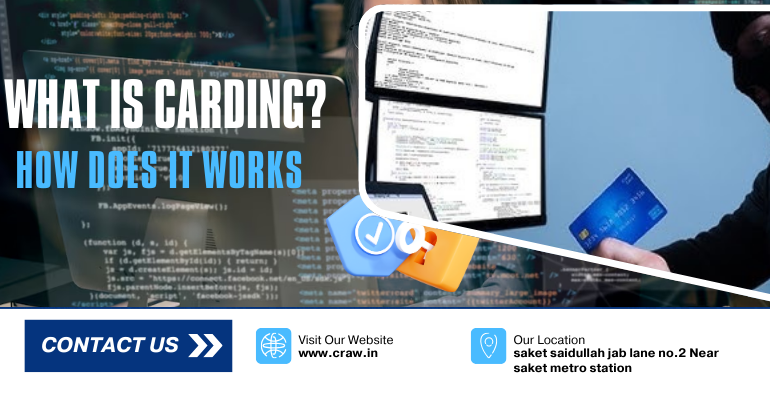What is Carding and How Does it Work | Carding Scam

What is Carding and How Does it Work | Carding Scam
What is Carding?
The theft of credit card information and the use of that information for unlawful transactions is what is known as “carding.” A sort of fraud known as credit card fraud occurs when hackers obtain access to the credit card credentials of another individual to make purchases or withdraw payments. A common occurrence is that the cardholder does not become aware that their information has been hacked until it is far too late, at which point severe damage has been done to their financial condition.
The Dark Side of Carding: Legal and Ethical Concerns
Although there are those who may consider carding to be a clever technique to “game the system,” it is in fact a serious breach of the law. You will face severe legal consequences if you are detected engaging in this behavior, in addition to the fact that it is unethical and harms both persons and businesses financially. In addition to being a violation of national as well as international laws pertaining to fraud, engaging in carding can result in severe penalties such as heavy fines, lengthy jail sentences, and irreparable harm to another person’s image.
How Carding Works?
Although the carding process is very simple, it does entail a number of processes and tools that cybercriminals use in order to carry out their schemes. As a general rule, it operates as follows:
- Data Theft: The carder can access the credit card information of another individual. Hacking, phishing, or purchasing stolen data on dark web markets are all methods that can be used to do this.
- Verification: A test is performed on the stolen data to determine whether or not it is still operational.
- Using the Card: Last but not least, the card is either used to make transactions throughout the internet, frequently for expensive things, or it is sold to other thieves.

Common Tools Used in Carding
- Carding Software: These are tools that aim to streamline the procedure of testing data that has been stolen from payment cards.
- Credit Card Generators: These programs generate fictitious credit card numbers that possess the potential to function on some internet platforms.
- VPNs and Proxies: To conceal their identity and location, carders employ these, which makes it more difficult for authorities to determine where they are.
Who Participates in Carding?
There are many different kinds of people who are involved in carding, ranging from amateurs with little to no experience to organized criminal gangs. Others do it with the intention of making a quick profit, while others view it as a long-term investment. Motives might vary, but the majority of people are driven by the desire to get money quickly and easily.
Carding Training Courses
There are numerous offers for carding training courses that can be found on the internet. These courses promise to educate you on how to become a successful carder of cards. But exactly what topics are covered in these classes?
The Curriculum: What’s Taught in These Courses
- Basic Techniques: Newcomers are instructed on how to acquire stolen card data, typically through the use of phishing or the purchase of data.
- Advanced Methods: The use of bots to automate transactions and the washing of money gained through carding are also examples of more complicated procedures.
- Avoiding Detection: Providing instruction on how to maintain one’s anonymity while participating in carding activities is one of the most important selling aspects.
The Reality of Carding Training
These classes frequently come with assurances of success and anonymity for the students. Nevertheless, the reality is that the majority of individuals who attempt to card are eventually caught, and the repercussions are severe. In most cases, the training programs themselves are fraudulent schemes that are intended to deceive naive individuals into paying for information that is without value or practices that have become outdated.
The Role of Certification
Furthermore, there are carding schools that assert that they provide certification, which lends an air of legitimacy to the entire operation. On the other hand, any accreditation that is associated with illegal conduct is, of course, unimportant. These so-called “certifications” are frequently a hoax in and of themselves, designed to trick individuals into believing that they have attained a degree of skill that will shield them from being discovered fraudulently. Nothing could be further from the truth than what is actually the case.
Why You Should Avoid Carding Training?
The fact that carding is against the law in every jurisdiction is the most essential factor to comprehend. For the following reasons, you should avoid enrolling in any kind of certification or carding course
- Legal Consequences: If you are detected, you might face serious consequences such as years in prison, hefty fines, and a lifelong criminal record.
- Ethical Considerations: Carding is a morally wrong choice since it results in actual harm being caused to both individuals and corporations.
- Financial Risks: As a result of the majority of newcomers losing their money to scams or having to pay legal fees, the promise of receiving easy money frequently results in financial devastation.
Cybersecurity and Ethical Hacking as a Safer Alternative
Consider pursuing a lawful profession in cybersecurity rather than engaging in illicit activities such as carding. Examples of such activities include. As the field of ethical hacking continues to expand, you will have the opportunity to put your skills to use to safeguard people from fraud rather than engaging in it yourself.
White Hat vs. Black Hat Hackers
White hat hackers are professionals who adhere to ethical standards and assist individuals and businesses in protecting their information. Black hat hackers, on the other hand, actively participate in unlawful actions. To establish a profession in cybersecurity, becoming a certified ethical hacker (CEH) is a means to build a career that is both respectable and legal.
Risks Associated with Carding Training Programs
During the training sessions themselves, participants are frequently placed in potentially hazardous circumstances. You run the danger of being targeted by law authorities or falling victim to schemes that have been set up by other criminals if you maintain associations with criminal networks.
The Myth of Anonymous Carding
In carding classes, one of the most significant myths that is spread is the notion that it is possible to maintain your anonymity. In point of fact, law enforcement agencies have become increasingly effective at ferreting out carders, even those who make use of virtual private networks (VPNs) and proxies.
Real-World Examples of Carding Arrests
A great number of carders have been apprehended and brought to justice in the past. Some of them have been located thanks to the digital footprints they left behind, while others have been apprehended thanks to the collaboration of foreign law enforcement authorities.
Legal Penalties for Carding
It is possible that you will be sentenced to several years in prison, large penalties, and a criminal record that will follow you for the rest of your life if you are discovered carding. When it comes to the legal repercussions, there is no amount of so-called “training” that can protect you from them.
Signs That You’re Being Scammed by a Carding Course
There are a lot of carding courses that are itself scams. This is how you can identify one:
- They make bold claims that they will make money easily.
- It is claimed that they provide techniques that are “foolproof” or anonymous.
- However, they charge exorbitant rates for information that is readily available on the internet for free.
The Future of Carding and Cybersecurity
The focus on cybersecurity is increasing in parallel with the development of carding techniques. As a result of an increase in the number of organizations investing in protection, more chances are becoming available to ethical hackers.
Conclusion
Even though carding could be appealing, the dangers involved much exceed the potential benefits. Participating in carding is a road that is associated with a number of risks and dangers, including legal repercussions and ethical problems. It is possible to create a career in cybersecurity without engaging in any unlawful actions if you are interested in the field. There are legitimate and legal ways to do it.
Hence, if you have a decent approach to understanding all the fundamentals of carding and other heinous activities of black hat hacking professionals, you can sincerely join Craw Security’s superb 1 Year Diploma in Cybersecurity Course, Powered by AI proposed by highly efficient training instructors with many years of classic work experience in providing the suitable training to all the interested learners. To know more about this primetime cybersecurity diploma course with the unique facility of learning more AI-based technicalities along with the latest features of cybersecurity almost free of cost, you can give us a call at our hotline mobile +91-9513805401 and have a word with our highly experienced educational counselors.
















